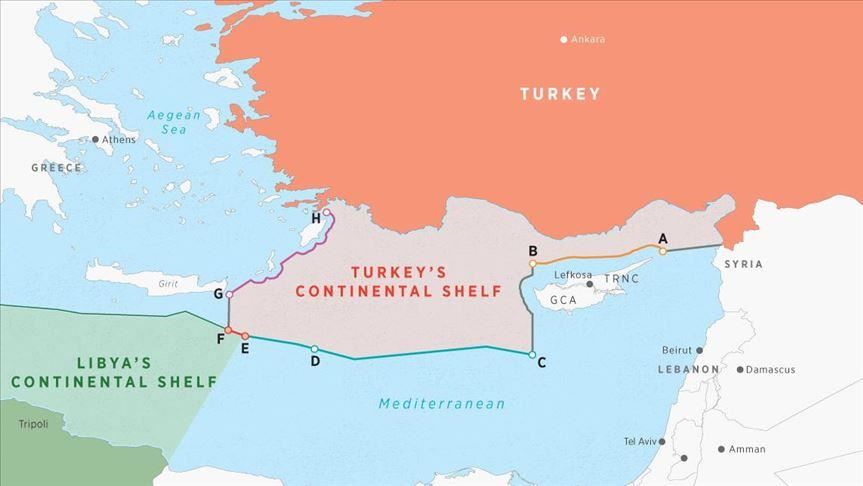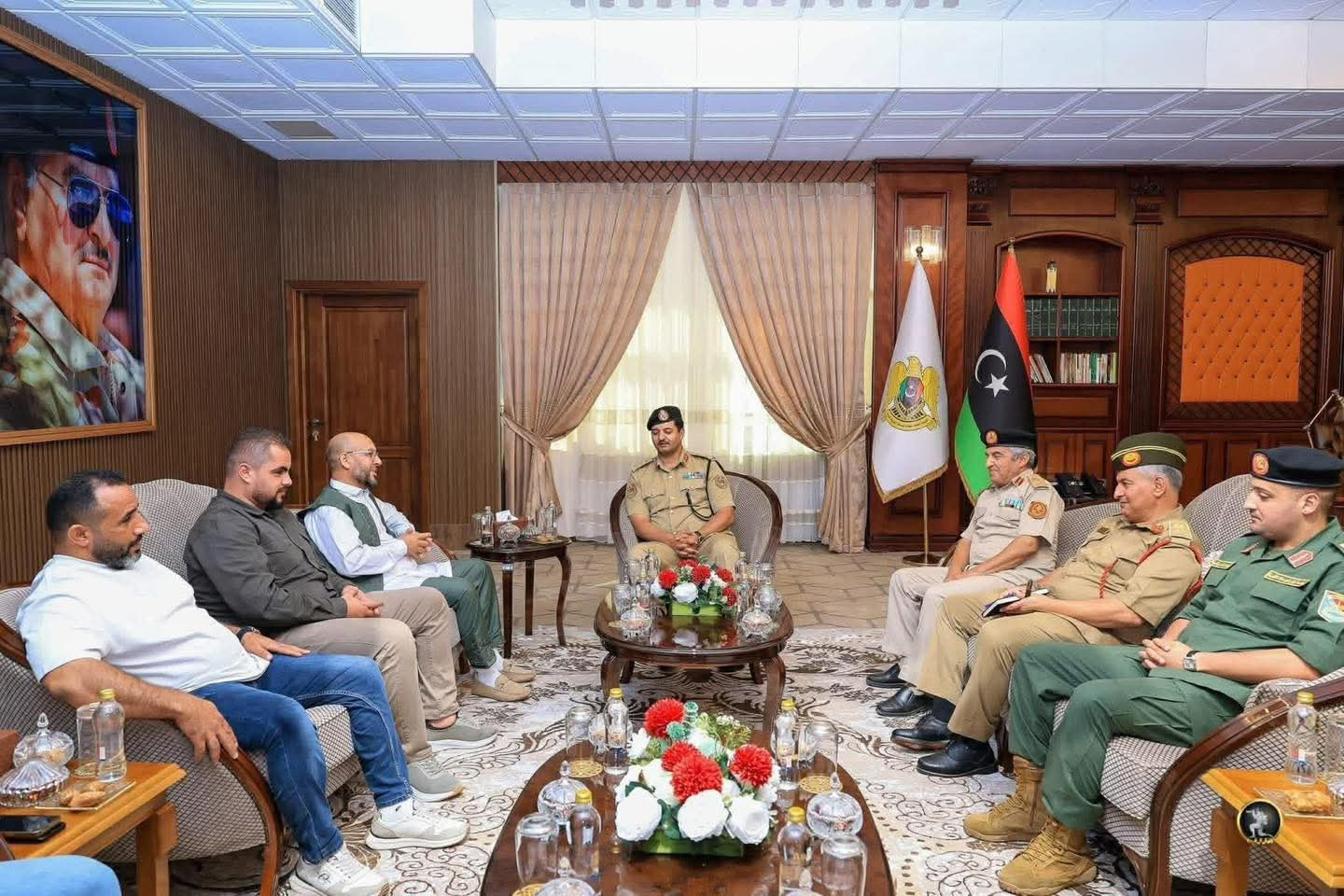
Libya-Türkiye’s 2019 maritime boundary MoU
Relations between Libya and Greece have recently come under increasing strain over the demarcation of maritime boundaries in the Mediterranean. Athens launched an international exploration tender in May with four offshore blocks including to the west and south of Crete. This angered both Libya and Türkiye because the blocks encroach on areas that are part of the demarcation zone that they agreed in the Memorandum of Understanding (MoU) that was signed by the previous Government of National Accord (GNA) in November 2019. The MoU lays out the boundaries of the Continental Shelf and delineates the Exclusive Economic Zone between the two countries (Libya Focus, December 2019).
Neither Greece nor the EU recognise the MoU, with the European Council concluding at the end of June that it ‘infringes upon the sovereign rights of third states, does not comply with the Law of the Sea and cannot produce any legal consequences for third states.’ These comments provoked anger in both countries with the Turkish ministry of defence refusing the EU’s characterisation of the MoU as illegal and complaining about the ‘unilateral political manipulations of Greece and the Greek Cypriot Administration.’
Libya was so incensed by the Greek tender that in late June it sent a Note Verbale to the UN to complain about the demarcation line upon which Greece has drawn up the licensing blocks. It challenged the ‘median line’ set by Greece and noted that these areas fall within maritime zones that remain subject to the long-running unresolved dispute between Libya and Greece. Libya accused Athens of infringement of its sovereign rights and of taking a unilateral measure lacking any legal basis or bilateral agreement, and also described it as a breach of international law.
Athens deployed two warships in the eastern Mediterranean in late June. Although it justified the move by asserting that the vessels were a response to the surge in migration and that they were conducting patrols, the move was interpreted in Libya as falling within the growing problem of maritime borders.
…as House hints at approving Libya-Türkiye MoU…
To add to the rising tensions, the House of Representatives (House0 has made things worse by hinting that it may approve the 2019 MoU. Both Khalifa Haftar and the House objected vociferously to the agreement at the time it was signed, because it came within the context of the Libya Arab Armed Forces’ (LAAF) war against Tripoli. At that time, Ankara rallied strongly behind the GNA, providing it with military and political support which eventually turned the tide and forced Haftar’s forces to retreat. The maritime MoU also gave Ankara the opportunity to push back against the growing co-operation between Greece, Cyprus, Egypt and Israel, which had previously signed maritime agreements drawing up their own respective Exclusive Economic Zones (EEZ).
Haftar and the east more broadly sided with the Greece-Egypt camp and denounced the Turkish-GNA MoU. The House’s apparent change of heart appears to be part of the east’s recent pivot towards Türkiye. This is not to suggest that the east is turning away from its traditional main backer, Egypt, but rather that it is responding positively to Ankara’s efforts to pursue a more balanced policy towards Libya that engages both the western and eastern camps.
The eastern authorities have been quick to welcome Turkish investment in the areas under its control. Belgasim Haftar has signed a raft of contracts with Turkish companies for projects carried out under his Libya Development and Reconstruction Fund (LDRF) (Libya Focus, April 2025). The LAAF has also been ready to foster military and security ties with Ankara, with notable visits to Türkiye by Saddam Haftar, chief of staff of the LAAF’s ground forces, over the past months.
There has been a noteworthy rapprochement therefore between Türkiye and the east, with Ankara now appearing to be a more favoured partner than Athens. As part of this coming together, Ankara is now believed to be pushing the east to approve the MoU that was signed by it and the GNA.
…but wants amendments
Whether the House will go as far as to actually approve the MoU has yet to be seen. The text is reportedly with the House’s technical committee and is being reviewed. It apparently wants to make a number of amendments to the agreement before giving it the go-ahead. One is said to relate to a clause allowing Türkiye the right to consent or reject to Libya’s contracting of any international company in relation to maritime energy exploration. The House is therefore unlikely to simply rubber stamp what was agreed by the GNA and some MPs are still said to be opposed to ratifying the MoU.
Furthermore, the east will need to weigh up the impact of its signing such a deal. Egypt is unlikely to welcome closer co-operation between Libya and Türkiye of this kind. The east’s signing up to the MoU will also not go down well with European states. This month some MPs complained that EU countries were putting pressure on them not to ratify the agreement so the east therefore needs to tread carefully.
For Haftar, however, the east’s formalising of the MoU would be a source of legitimisation from Ankara, which is something that the eastern authorities are not currently getting from Greece or its European allies. With EU states still refusing to even acknowledge the GNS, Türkiye is offering the east the chance to strike a formal agreement with another state. Furthermore, like the Tripoli camp, Haftar is wary of Greek expansion in the Mediterranean.
With this in mind, Greece is trying hard to resolve the crisis. Foreign Minister Giorgos Gerapetritis visited both Tripoli and Benghazi in July to discuss the matter and to try to calm tensions. However, no agreement was struck, indicating that tensions over this controversial issue will persist.
This excerpt is taken from Libya Focus, our monthly intelligence report on Libya. Click here to receive a free sample copy.The July 2025 issue of Libya Focus also includes the following:
Politics
- GNU Prime Minister Abdelhamid Dbeibah ups the stakes…
- The Special Deterrent Force (SDF, a.k.a. RADA)
- Cracks appear with Presidency Council…
- Uproar over Abdel Monam al-Marimi’s death…
- High Council of State leadership elections next month
Foreign Relations
- EU delegation is ejected from the east…
- Tensions flare up with Greece…
Security
- Osama al-Juweili takes control of Ghadames…
Energy & Economy
- Speculation about NOC head…
- BP and Shell sign agreements with the NOC



